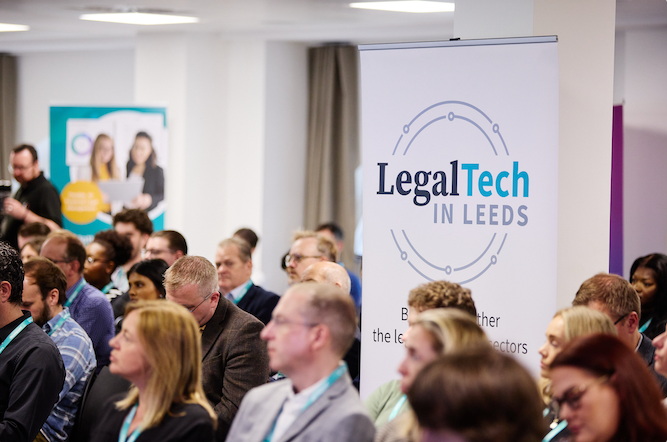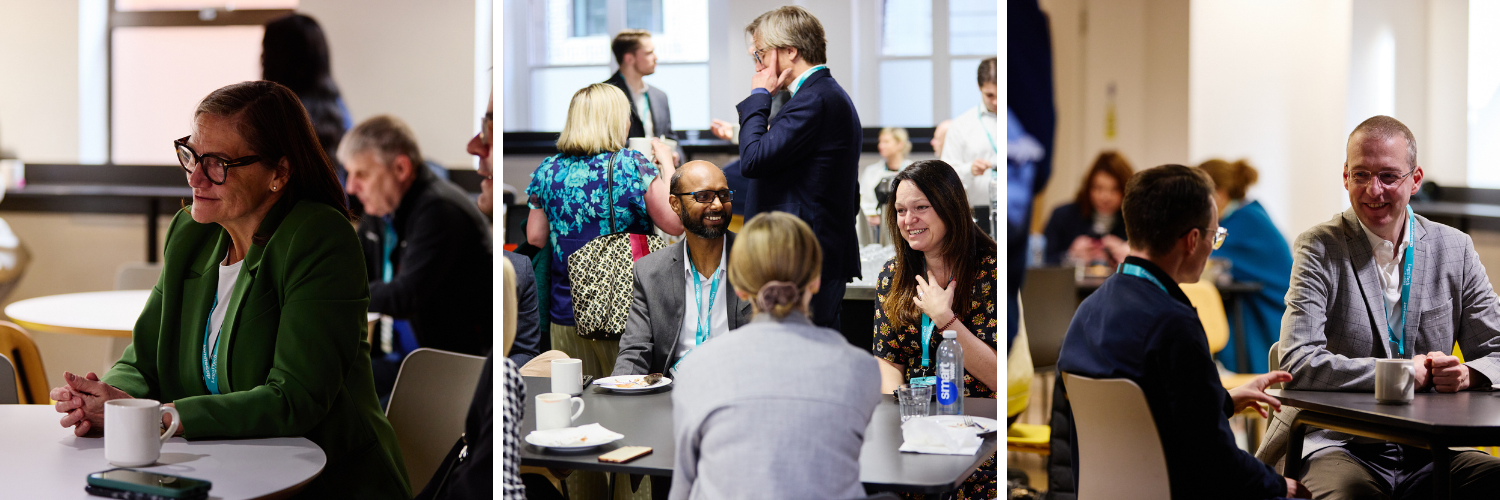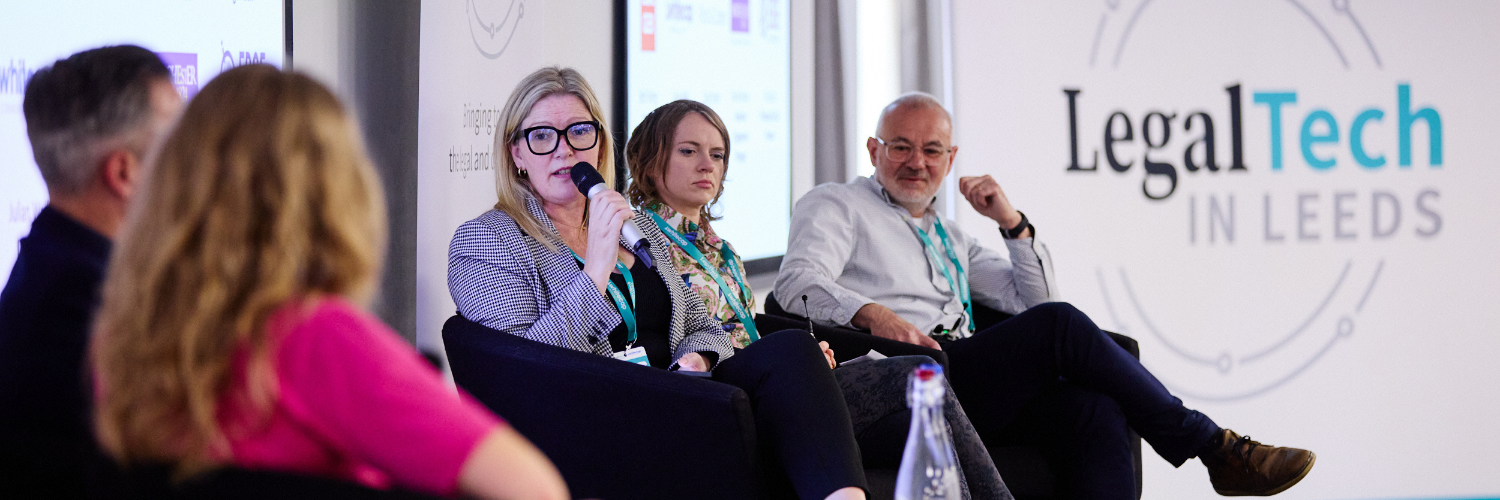
On Thursday 24th April, LegalTech in Leeds 2025 brought together legal professionals, technologists, academics, innovators, and public sector leaders for a full day of bold thinking and practical action.
Hosted in the heart of Leeds, a city fast becoming one of the UK’s leading LegalTech and digital innovation hubs, the conference showcased the region’s thriving ecosystem, while also addressing global trends shaping the legal services landscape.
From the opening remarks to the final session, the energy was undeniable: an ambitious, diverse community coming together to share ideas, challenge assumptions, and explore what’s next in law, technology, and education.
Throughout the day, several core themes emerged, shaping both conversation and collaboration:



The day opened with a warm welcome from the LegalTech in Leeds team, setting the tone for a day focused on knowledge sharing, sector growth, and inclusive innovation.
Nigel Brook, President of Leeds Law Society and Legal Director at Tyr, delivered the opening address. He spoke of Leeds as a key player in shaping the future of LegalTech in the UK. His remarks highlighted the importance of community, collaboration, and momentum. It was a reminder that meaningful change in legal services begins locally, with committed people and bold ideas.


The first panel of the day brought together leading voices from across the legal and tech sectors:


The panel explored the current maturity of the UK LegalTech sector, comparing it to markets such as Ireland. Several speakers addressed the shift in skill demands, noting the rise of project management, AI literacy, and soft skills as essential attributes for modern legal professionals.
Madi Robinson emphasised the importance of buy-in from leadership and users alike, especially in in-house teams, and shared how Channel 4 is working to embed innovation with measurable return on investment. Rob Hanlon spoke about the growing prominence of non-traditional legal providers, and the challenge of attracting and retaining top legal talent in a rapidly shifting marketplace.
Alistair Maiden highlighted the divide between those embracing new technologies and those still hesitant. He encouraged firms to take action, stating plainly that if you are not using AI to improve your work, you are already behind.
The conversation also turned to risk and regulation, with a strong focus on how AI and automation must be introduced responsibly. The panel closed with reflections on career paths, noting the growing appetite for agile, tech-aware legal careers and the need to evolve recruitment and training accordingly.
Dr Virág Blazsek, Deputy Director of the Centre for Business Law and Practice at the University of Leeds, delivered a timely keynote connecting energy policy and the sustainability of LegalTech.
Her message was clear. Without affordable and reliable energy, LegalTech cannot scale. The UK's current energy infrastructure, shaped by decades of underinvestment, presents a serious constraint. She urged LegalTech firms to integrate sustainability into their strategies through practices like ISO certification and deeper knowledge of energy law.
She also encouraged stronger ties between UK-based LegalTech and international markets, particularly the United States, where tax incentives and innovation frameworks offer opportunity.
LegalTech leaders, she argued, must not only build smart software but also operate with an eye on resilience, regulation and environmental responsibility.

Mandy Ridyard, Business Advisor to the Mayor of West Yorkshire, took to the stage to outline the region’s broader ambitions for innovation-led growth.
She spoke about the importance of integrated infrastructure, including the region’s commitment to a fully connected transit system. She highlighted the strategic opportunities in data and AI, pointing to Microsoft's plans to establish a new data centre in West Yorkshire as a sign of regional readiness.
Mandy positioned West Yorkshire as a future leader in AI and LegalTech, combining its industrial heritage with growing investment, connectivity and collaboration across sectors.

A key mid-morning panel showcased the depth and breadth of LegalTech activity across the UK’s regions. Chaired by Beth Fellner, Director of Legal Geek and LawtechUK, the session brought together leaders from a number of regional initiatives:



Each speaker brought a unique perspective on how LegalTech clusters are evolving in their respective regions. The panelists agreed that the sector is moving beyond early adopters, with mid-tier firms and academic institutions becoming increasingly engaged.
Julian Wells stressed the importance of collaboration over competition, highlighting Whitecap’s work in mapping regional economic data to help shape policy, accelerator programmes and funding priorities. Chris Bull reflected on the sector’s increasing diversity and maturity, particularly as firms grow more confident experimenting with AI.
The panel concluded with each speaker sharing their ambitions for the future. Beth called for deeper engagement with small law firms. Julian emphasised the need to accelerate understanding of key technologies and skills, noting that a lack of digital capability remains a major barrier. Clare advocated for increased recognition of place-based initiatives and cross-sector interoperability, while Rachel pushed for greater engagement between academia and industry, particularly in relation to ethics and sustainability. Chris championed collaborative development of core technology infrastructure across firms.

Following the panel, a series of partner-led presentations demonstrated how LegalTech is being applied in real-world settings to drive efficiency and create value:
rradar: Stephanie Thirlwell and Emma Yates presented a compelling case study from the firm’s regulatory and IP teams, underlining how modern legal practices can embed innovation across service lines. A visually impactful video captured rradar’s commitment to client-focused transformation.

PEXA: Angela Hesketh discussed PEXA’s work on digitising property transactions, inspired by progress in Australia. She spoke about the need to rebuild trust in the property transaction process through strategic simplification and industry collaboration. Angela also introduced the Future Property Transactions Group, created in partnership with Whitecap Consulting, to drive sector-wide reform.

Walker Morris and Curvestone AI: Innovation Lead Laura Pilkington, alongside Curvestone’s Dawid Kotur and Amy Woodcock, shared a detailed case study on deploying generative AI to streamline service agreement reviews. The pilot cut review times significantly and demonstrated how close collaboration and iteration are key to successful LegalTech projects. Their message was clear: keep things simple, iterate quickly, and always align innovation with measurable return on investment.

Justice Unlocked: Patrick Grant (University of Law) and Adam Roney (Calls9) explored how small firms can adopt AI tools despite limited resources. With 80 percent of legal needs going unmet, they argued that smaller practices are closest to the challenges but farthest from the technology. Their joint presentation made the case for accessible, people-first AI that supports new revenue models.

The final session before lunch turned attention toward the future workforce. Chaired by Victoria Boothby, a trainee solicitor at Schofield Sweeney, the panel brought together academics from across Leeds’ legal education landscape:


The panel tackled some of the most pressing questions around how we prepare law students for a future shaped by technology, ethics, and evolving client expectations.
Patrick Grant introduced the University of Law’s approach, focusing on building confidence and adaptability rather than teaching specific technologies that may become obsolete. He referenced the ULTRA programme, which integrates legal tech awareness into broader skill development. Dr Steven Montagu-Cairns discussed how legal practice is becoming more collaborative and cross-disciplinary, requiring students to understand project management and teamwork as well as legal theory.
Dr Jessica Guth reflected on how LegalTech can help widen participation in legal education. She highlighted the role of technology in levelling the playing field for neurodiverse students and those with different educational backgrounds. Professor Nnenna Ifeanyi-Ajufo called for ethics and transparency to be integrated across the curriculum. She raised questions about AI use in client work, including how and whether its use should be disclosed, and what impact it could have on pricing, liability and trust.
Together, the panellists stressed that LegalTech education must go beyond tools. It should foster critical thinking, ethical decision-making, and readiness for a profession that is rapidly becoming more technologically complex.


The afternoon kicked off with a series of breakout sessions that provided more targeted insight into specific LegalTech challenges and opportunities. Each session brought together sector experts to discuss practical applications, skills evolution, and digital transformation strategies.
Data Literacy and Skills Evolution
Clare Grant and Thea Lee (BPP) led a session on the evolving capabilities legal professionals need to thrive in a digitally enabled environment. From AI understanding to data literacy, their message was clear: the sector must invest in people if it hopes to keep pace with the technology.

AI in SME Law Firms
Keith Bermingham (Clio) and Professor Danat Valizade (University of Leeds) explored how smaller firms can meaningfully adopt AI. The session covered common adoption barriers and emphasised scalable solutions that can work within limited resources.


In-House Innovation
Allan Smith (Mint) and Madi Robinson (Channel 4) shared perspectives on how LegalTech is transforming in-house legal functions. They highlighted the importance of agility, user engagement and tailoring solutions to internal operations, not just legal outputs.
AI and Property Digitisation
Angela Hesketh (PEXA) and Eric Tom Mathews (University of Leeds) discussed how AI and machine learning are changing property transactions. Their session focused on process friction, data trust frameworks, and the infrastructure needed to support systemic innovation in legal and property markets.



Julian Wells (Whitecap Consulting) and Stephen Browning (Innovate UK) presented the newly launched AI for Services 2025 report. This national report offers a strategic overview of innovation trends across the UK's Professional and Financial Services (PFS) sector, with particular attention to regional growth and digital transformation.

Key takeaways included:
The report reinforced the critical role LegalTech will play in driving innovation, productivity, and equity across the broader professional services landscape.

The final showcase of the day, facilitated by Bradley Collins (CEO and Co-Founder of LegalTechTalk), brought a burst of energy and entrepreneurial insight. Each presenter was given the opportunity to demonstrate how their product or initiative was solving a specific challenge in the legal sector.
Matterbee: Co-founder Grant Ripley introduced Matterbee as an all-in-one legal management platform designed to replace fragmented systems. With features including matter management, document handling, time tracking and billing, the platform offers small and mid-sized firms a flexible and centralised workspace tailored to their needs.

Katchr: Managing Director Graham Moore demonstrated how Katchr’s law firm dashboards help firms unlock actionable data insights. By providing real-time access to performance metrics, Katchr enables leaders to improve profitability, efficiency and decision-making without requiring complex data tools.

Quiss: Andy Hawley presented Quiss’ approach to IT modernisation in the legal sector, showcasing how law firms can roadmap digital transformation, enhance cybersecurity and partner with external providers to strengthen internal IT teams.

Barrister Link: Paul Wright highlighted how the platform simplifies the process of connecting with barristers and managing case communication. Designed for ease of use, Barrister Link brings together access to expertise and streamlined documentation in one secure environment.

LegalTech India: Nimrat Kaur Dhillon, Community Maverick at the ILTN, shared insights into building LegalTech communities that are global in scope but grounded in local engagement. She emphasised authenticity, inclusion, and relationship-building as critical to creating sustainable innovation networks.

TiPS Accelerator (Oxford Brookes University): Francisco Trincado-Munoz unpacked recent research on technology adoption in professional services, including how trust influences innovation outcomes. He provided practical do’s and don’ts for successful LegalTech deployment and urged firms to rethink transformation strategies with human factors in mind.

FileOps: Tim Suiter introduced FileOps, a solution designed to improve email productivity for legal professionals. By helping lawyers better manage their inboxes and automate routine communications, FileOps frees up time for higher-value work and improves focus across teams.

The final session featured Rob Hanlon (Senior Sales Manager – EMEA, Clio) in conversation with Susan Ford (Head of Knowledge, DAC Beachcroft). The session reflected on Clio’s growth journey from startup to unicorn, with a valuation of $1.6 billion and annual recurring revenue of over $100 million as of 2022.

Rob explained that Clio’s success was grounded in being cloud-native, lawyer-specific, and focused on solving core practice challenges. Their vertical SaaS approach allowed them to remain user-focused, especially for small and mid-sized firms. Susan asked about the hurdles in scaling such a product, to which Rob pointed to the shift from serving solo practices to larger firms as a key inflection point.
The session also touched on Clio’s product roadmap, with growing investment in AI, multilingual capabilities and security. Rob noted the importance of making AI accessible and intuitive, drawing a parallel with tools like Clippy, the once-beloved Microsoft Office assistant. He underscored Clio’s commitment to building trust in technology through transparency and safety by design.

LegalTech in Leeds 2025 captured the momentum and maturity of a sector in evolution. From regional ecosystem building to international collaboration, from ethical education to AI adoption, the conference highlighted one common thread: LegalTech is not just about tools, it is about people.
Whether you are a founder, law student, policy maker, technologist, or practitioner, the conversations sparked at this year's conference are just the beginning.
Take the next step:
Thank you to all our speakers, partners, sponsors, and attendees for being part of LegalTech in Leeds 2025.
The future of law is being built together, and it’s being built here.
LegalTech in Leeds is made possible through the generous support of our sponsors. Thank you to our 2025 sponsors: rradar, University of Leeds, Leeds Trinity University, Bruntwood SciTech, The University of Law, PEXA UK, BPP University, Walker Morris LLP, Quiss Technology PLC, Katchr, Matterbee, and Clio – Cloud-Based Legal Technology.
We captured some brilliant moments from across the day, from dynamic panels to buzzing networking sessions.
Browse the gallery here.
If you spot yourself and would like a high-resolution copy, or prefer not to be included, please contact us.
These images are shared to celebrate our community and may not be used commercially without prior permission.
What a great day to share this article...